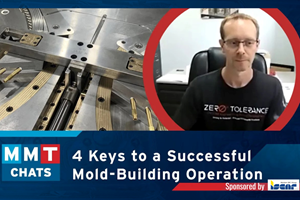The Bottom Line: Deducting Meals and Entertainment Expenditures
Is your shop in compliance?
Many shop owners are aware that they may deduct all or a portion of the costs associated with business meals and/or entertainment, but these expenditures are still subject to additional conditions in order for the shop to claim a deduction for federal income tax purposes. Deducting these types of expenditures requires mold shops to jump through additional hoops, and they are then still subject to additional tests and certain limitations.

Business meals and entertainment can be a critical part of growing a moldmaker’s business. The IRS will allow the proper amount of deductions when the shop can show that the meal or entertainment has a business purpose, but documentation of the business purpose is key to successfully sustaining these expenditures upon examination.
Ordinary and Necessary
All business expenses must meet the general deductibility requirement of being “ordinary and necessary,” which means that the expenditure must be considered customary and usual within the mold building industry (ordinary) and appropriate and helpful to the mold shop’s business (necessary). Since it is customary to share meals and/or entertain customers or other business associates, shops should be able to pass this general test. However, motivation for a business meal plays a part in determining whether the meal is a deductible business expense as well. If the primary motivation for the meal is personal or social, the deduction is disallowed. The rules barring a deduction for personal expenses take precedence over the rules allowing a deduction for business expenses.
In 2001, the United States Tax Court determined that a husband and wife’s dinner expenditures for “board of director” meetings were not deductible. The husband and wife were the sole shareholders, with the husband having complete control of the business. The court found there was no business necessity for the man to spend anything to discuss the affairs of the corporation with his wife.
Any entertainment expenditures incurred at a trade association event that relate to attending the event are considered ordinary and necessary, including for example, an association’s scheduled program of business activities (committee meetings, lectures, panel discussions or exhibits). The program is the principle activity of the event and is deductible.
“Directly Related To” or “Associated With”
For meals and entertainment to be deductible, they must be either “directly related to” or “associated with” the shop’s business. “Directly related to” means they include an active discussion aimed at obtaining immediate revenue or that a specific benefit is expected to be derived, and they are not just for general goodwill or being viewed favorably by a customer. However, an expenditure may also be deductible if the expense is “associated with” the mold shop’s business. For example, the meal or entertainment precedes or follows a substantial business discussion on the same day.
Entertainment is considered associated with the active conduct of business if the expenditure is clearly for a business purpose, such as to gain new business or to encourage the continuation of an existing business relationship. In fact, goodwill business entertainment at night clubs, sporting events, theaters or hunting/fishing trips meeting this requirement is deductible. In one tax case, a manufacturer that incurred expenditures associated with an employee fishing trip at a five-star resort after its annual two-day sales meeting at company headquarters was able to deduct the cost of the fishing trip, as the company established a specific business purpose for the trip. The employees didn’t view it as a free vacation, but rather as part of their jobs.
An exception to the general rule is that expenditures need not be “directly related to” or “associated with” the active conduct of business if the expenditures are primarily for the benefit of the shop’s employees and are recreational, social or similar. For example, Christmas parties, annual picnics or summer outings.
Percentage Limitation
The amount allowable as a deduction for certain meals and entertainment expenses cannot exceed 50 percent of the otherwise allowable deduction. This limitation applies to any expenses for food or beverages, and any activity that is generally considered to be for entertainment, amusement or recreation. Taxes and tips associated with meals or entertainment are included in the total amount subject to the percentage limitation.
Otherwise-allowable deductions for the cost of transportation to and from business meals or entertainment are not subject to the percentage limitation. For instance, cab fares or business mileage to and from a business meal or a business event are 100-percent deductible.
No deduction is allowed for any food or beverage expense that is considered lavish or extravagant under the circumstances. If a business meal is deemed lavish or extravagant under the circumstances, a shop must determine the portion of the meal that is not lavish or extravagant, then multiply that amount by the percentage limitation (50 percent) to determine the amount allowable as a deduction.
The IRS will err towards an expenditure being classified as entertainment. That means that if a shop could argue that the expenditure is both entertainment and advertising/public relations, the IRS will deem the expenditure to be entertainment and then subject to the percentage limitation.
One example of an entertainment expenditure is a ticket to an entertainment or recreational facility. In determining the deduction, the amount taken into account can’t exceed the face value of the ticket. For example, if a tool shop owner pays $200 for two tickets through Stub Hub with a face value of $80 each ($160 total) for a customer and himself to attend a St. Louis Cardinals game, the deduction cannot be more than $80 (the $160 face value times the 50-percent limitation).
Where a skybox or other private luxury box is leased for more than one event, the amount otherwise allowable as a deduction is limited to the face value of a non-luxury box ticket. However, the shop should keep in mind that the deduction is only available for events in which the skybox is used in connection with entertainment that’s directly related to or associated with the active conduct of the shop’s business. Shops should be sure to document the business discussions that occur before, during or after the event.
If one party is reimbursed by another party for meals and entertainment in connection with the performance of services, the 50-percent limitation on the deduction is imposed on the party who makes the expenditures or actually bears the expense. For example, if a shop’s attorney or CPA is reimbursed by the shop and provides an accounting of such expenditures, the 50 percent limitation on the deduction is imposed on the shop, not the attorney or CPA.
The 50-percent limitation does not apply to the cost of meals included in deductible educational expenses. For example, if a shop sends four employees to Amerimold to learn about new technical advancements within the industry, it does not have to carve out the cost of lunch provided as part of the employees’ admission. The lunch provided as part of the technical program is 100-percent deductible.
Also, the percentage-limitation rule doesn’t apply to meals and entertainment expenses that are part of a package that includes a ticket to attend certain charitable sporting events. For the costs to be fully deductible, the event must be organized for the primary purpose of benefiting a charitable organization, must contribute 100 percent of the proceeds to the charity and must use volunteers for substantially all work performed in carrying out the event. For example, a golf tournament that donates all of the new proceeds from the event to charity could qualify under this exception.
Related Content
MMT Chats: 4 Keys to a Successful Mold-Building Operation: Innovation, Transparency, Accessibility and Relationship
MoldMaking Technology Editorial Director Christina Fuges chats with Steve Michon, co-owner of Zero Tolerance in Clinton Township, Michigan, about the excitement of solving problems, the benefits of showing gratitude, the real struggle with delegation and the importance of staying on top of technology. This episode is brought to you by ISCAR with New Ideas for Machining Intelligently.
Read MoreMaking Mentoring Work | MMT Chat Part 2
Three of the TK Mold and Engineering team in Romeo, Michigan join me for Part 2 of this MMT Chat on mentorship by sharing how the AMBA’s Meet a Mentor Program works, lessons learned (and applied) and the way your shop can join this effort.
Read MoreThink Safety: Eliminate Hazards Throughout the Shop
The tooling community is taking advantage of new products for safer mold shops and molding facilities.
Read MoreEditorial Guidelines: Editorial Advisory Board
The Editorial Advisory Board of MoldMaking Technology is made up of authorities with expertise within their respective business, industry, technology and profession. Their role is to advise on timely issues, trends, advances in the field, offer editorial thought and direction, review and comment on specific articles and generally act as a sounding board and a conscience for the publication.
Read MoreRead Next
The Bottom Line: A Method to the Tax Madness
Every shop must adopt a method of accounting for activities within its business, and cash and accrual methods are two commonly used ones.
Read MoreHow to Use Strategic Planning Tools, Data to Manage the Human Side of Business
Q&A with Marion Wells, MMT EAB member and founder of Human Asset Management.
Read MoreHow to Use Continuing Education to Remain Competitive in Moldmaking
Continued training helps moldmakers make tooling decisions and properly use the latest cutting tool to efficiently machine high-quality molds.
Read More




















